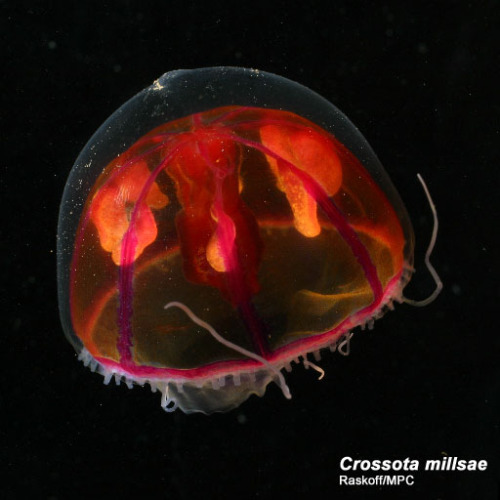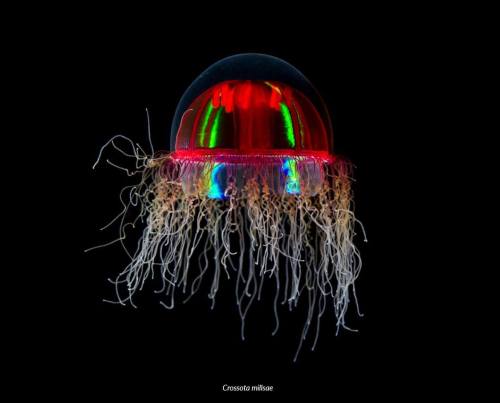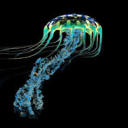Atolla Jelly


Atolla Jelly
Atolla wyvillei
The Atolla Jelly is a fiery, red jellyfish that has an extraordinary display of bioluminescence. When the jelly is attacked, it uses bioluminescence to produce thousands of vibrant, blue flashes; the blue flashes act as an alarm, which draws in bigger predators and warns prey. The jelly can be found at depths between 600 m to 1500m, and it also has a long hypertrophied tentacle that aids in reproduction.
Photo credit: https://en.wikipedia.org/wiki/Atolla_jellyfish
https://en.wikipedia.org/wiki/Atolla_jellyfish
More Posts from Bioluminescentoceangoddess and Others

Glasshead Grenadier
Hymenocephalus italicus
The Glasshead Grenadier is a small deep sea fish named due to a transparent memberane that covers its head. It has fragile head bones, and it feeds on surface copepods and crustaceans. This fish is located between 100 m to 2000 m in the ocean.
Photo credit: https://www.fishbase.se/summary/1720
https://www.futura-sciences.com/planete/photos/oceanographie-abysses-ces-merveilles-profondeurs-40-photos-686/ocean-grenadier-vitrier-hymenocephalus-italicus-poisson-abysses-4541/


Pink Helmet
Aglantha digitale
The Pink Helmet is a mini hydromedusa that comes in a variety of vibrant colors. The tiny jelly is only 4 cm in size and is found towards the surface of the ocean. The purple and blue hues we see in its bell are caused by a phenomenon known as iridescence, when light strikes the jelly’s thin tissue at different angles (similar to what we see in a soap bubbles). It also has orange pigmentation near its mouth; this pigmentation helps attract prey and mask luminescence. Furthermore, females tend to be more colorful than males.
Photo credit: https://biolum.eemb.ucsb.edu/organism/pictures/aglantha.html
https://www.pinterest.com/pin/186899453255850798/

Squarenose Helmetfish
Scopelogadus beanii
The Squarenose Helmetfish is found between 800m to 4000m in the ocean. It received this unique name due to its scales reminding scientists of an armored helmet worn by medieval knights. It also has unusual holes around its face, and the white strands covering its face are sensory canals.
Photo credit: https://www.vistaalmar.es/especies-marinas/peces-extranos/449-que-peces-mas-extranos.html

Vampire Squid
Vampyroteuthis infernalis
Even though the Vampire Squid is named after a notorious monster, this gentle creature does not live up to its name. It is only a foot long and occupies depths between 650m to 1500m in the deep ocean. Unlike other squids, it has reduced musculature and collects particles in the water column. However, it is capable of huge bursts of speeds. It uses bioluminescence to confuse both predators.
Photo credit: https://ocean.si.edu/ocean-life/invertebrates/vampire-squid-hell

Hula Skirt Siphonophore
Physophora hydrostatica
The Hula Skirt Siphonophore a deep sea siphonophore that is found between 700 m to 1000m. It is made of a colony of hundreds tiny zooids. The top portion of the colony holds the swimming bells, which allow the colony to move. The bottom of the siphonophore holds the orange ‘hula skirt,’ which is full of stinging tentacles.
Photo link : https://twitter.com/montereyaq/status/1162068535331311617?lang=da


Pigbutt worm
Chaetopterus pugaporcinus
The Pigbutt worm or the flying buttocks of the sea is spotted floating between 965 m to 1300 m in the deep ocean. It is actually a polychaete (polly-keet) worm species that burrows in the ground as an adult, and floats around the ocean as a baby. The worm feeds itself : by creating a balloon of mucus; collecting particles on the mucus; and then consuming the particles. It is the rarest and thickest worm in the deep ocean, for only ten have been spotted.
Photocredit: https://roaring.earth/pigbutt-worm/





Wake up babe new fish dropped


Psychedelic Medusa
Crossota millsae
The Psychedelic Medusa is a deep-sea hydrozoan that is abundant in the North Pacific. The mini-jelly is found at depths between 1000m to 3800m, and are often observed drifting near the ocean floor. It also has an eccentric reproduction behavior uncommon in cnidarians. The females display viviparity, and carry the babies in her bell until they are ready to hatch.
Photo credit: http://www.arcodiv.org/watercolumn/cnidarian/Crossota_millsae.html
https://twitter.com/spothvegr/status/1030177493075079169


Jewel Squid
Histioteuthis heteropsis
The Jewel Squid is covered in color-changing photophores that resemble sparkling gem stones. They also have a light-red coloration and are about 20 cm in length. They display a unique behavioral adaptation called diel migration. During the day, they stay at depths around 400-1200 m, and then surface during night (0-400m). This behavioral pattern is designed maximize feeding at night, and avoid predators during the day. The primary predator of the Jewel Squid is the Sperm Whale.
Photo credit: https://www.pinterest.com/pin/722827808920240115/
https://twitter.com/theoctonation/status/1168516522270253056


Cigar Comb Jelly
beroe forskalii
The Cigar Comb Jelly is a gelatinous ctenophore that is marveled by many due to its sparkling bioluminescence. It tends to elegantly float around 120 m in the ocean. It uses unique, hair-like structures called ctens to move horizontally in the ocean. It also swims in a spiral pattern before consuming zooplankton in the ocean.
Photo credit: https://www.wrobelphoto.com/gelatinouszooplankton/h25347306
https://www.flickr.com/photos/a_migotto/27227530815
-
 jellyfish-neo reblogged this · 7 months ago
jellyfish-neo reblogged this · 7 months ago -
 jellyfish-neo liked this · 7 months ago
jellyfish-neo liked this · 7 months ago -
 scentedfartcollector liked this · 7 months ago
scentedfartcollector liked this · 7 months ago -
 howlite-returns liked this · 1 year ago
howlite-returns liked this · 1 year ago -
 ghoulish-gazebo liked this · 1 year ago
ghoulish-gazebo liked this · 1 year ago -
 s41nt-b3rn4rd liked this · 1 year ago
s41nt-b3rn4rd liked this · 1 year ago -
 official-megumin reblogged this · 1 year ago
official-megumin reblogged this · 1 year ago -
 official-megumin liked this · 1 year ago
official-megumin liked this · 1 year ago -
 a-sentient-cup reblogged this · 1 year ago
a-sentient-cup reblogged this · 1 year ago -
 mycellpics liked this · 1 year ago
mycellpics liked this · 1 year ago -
 anathematic liked this · 2 years ago
anathematic liked this · 2 years ago -
 aeshnacyanea2000 reblogged this · 2 years ago
aeshnacyanea2000 reblogged this · 2 years ago -
 nessie-fi liked this · 2 years ago
nessie-fi liked this · 2 years ago -
 letterfromajax liked this · 2 years ago
letterfromajax liked this · 2 years ago -
 mumunga liked this · 2 years ago
mumunga liked this · 2 years ago -
 the-blue-phantom reblogged this · 2 years ago
the-blue-phantom reblogged this · 2 years ago -
 proximally reblogged this · 2 years ago
proximally reblogged this · 2 years ago -
 blaster-miraculous liked this · 2 years ago
blaster-miraculous liked this · 2 years ago -
 fruitingbodyworship reblogged this · 2 years ago
fruitingbodyworship reblogged this · 2 years ago -
 bornunderpunchestheheatgoeson liked this · 2 years ago
bornunderpunchestheheatgoeson liked this · 2 years ago -
 genderfuckt reblogged this · 2 years ago
genderfuckt reblogged this · 2 years ago -
 gloombog liked this · 2 years ago
gloombog liked this · 2 years ago -
 verminhost reblogged this · 2 years ago
verminhost reblogged this · 2 years ago -
 khulud-is liked this · 2 years ago
khulud-is liked this · 2 years ago -
 eldriwolf liked this · 2 years ago
eldriwolf liked this · 2 years ago -
 x-martina-crane liked this · 2 years ago
x-martina-crane liked this · 2 years ago -
 dookiebadookie liked this · 2 years ago
dookiebadookie liked this · 2 years ago -
 chasing10squirrels liked this · 2 years ago
chasing10squirrels liked this · 2 years ago -
 cherry-robo liked this · 2 years ago
cherry-robo liked this · 2 years ago -
 cazaui-rexan liked this · 2 years ago
cazaui-rexan liked this · 2 years ago -
 000h-la-la liked this · 2 years ago
000h-la-la liked this · 2 years ago -
 floaty-ghost reblogged this · 2 years ago
floaty-ghost reblogged this · 2 years ago -
 katbird0152 liked this · 2 years ago
katbird0152 liked this · 2 years ago -
 electric-sympathy liked this · 2 years ago
electric-sympathy liked this · 2 years ago -
 museofdemons reblogged this · 2 years ago
museofdemons reblogged this · 2 years ago -
 stubbornmarrow liked this · 2 years ago
stubbornmarrow liked this · 2 years ago -
 espia1-blog liked this · 2 years ago
espia1-blog liked this · 2 years ago -
 beautiful-desolation reblogged this · 2 years ago
beautiful-desolation reblogged this · 2 years ago -
 beautiful-desolation liked this · 2 years ago
beautiful-desolation liked this · 2 years ago -
 hellpenis900 reblogged this · 2 years ago
hellpenis900 reblogged this · 2 years ago -
 null-of-limbo reblogged this · 2 years ago
null-of-limbo reblogged this · 2 years ago -
 null-of-limbo liked this · 2 years ago
null-of-limbo liked this · 2 years ago -
 shitsngiggles666 liked this · 2 years ago
shitsngiggles666 liked this · 2 years ago -
 bovinespongiformencephasloppathy liked this · 2 years ago
bovinespongiformencephasloppathy liked this · 2 years ago -
 the-foolish-maker-of-worlds liked this · 2 years ago
the-foolish-maker-of-worlds liked this · 2 years ago -
 radioquikr reblogged this · 2 years ago
radioquikr reblogged this · 2 years ago

Bioluminescence is a chemical reaction that produces light. Many deep sea animals use bioluminescence. This blog is dedicated to educating the public about the amazing creatures that thrive in the deep sea.
57 posts